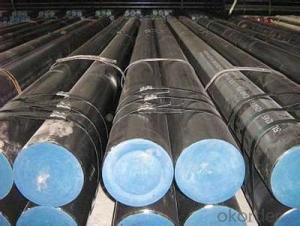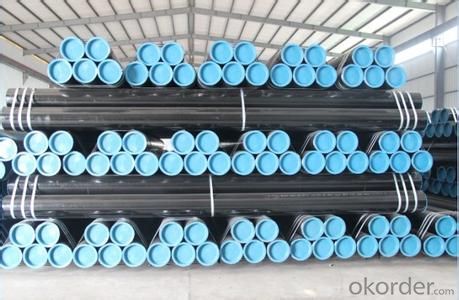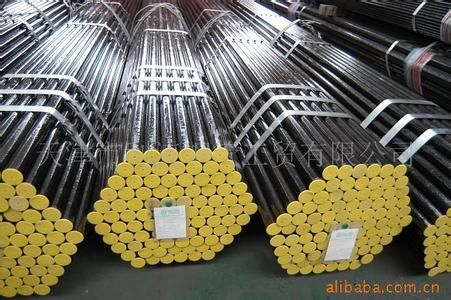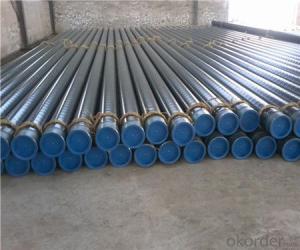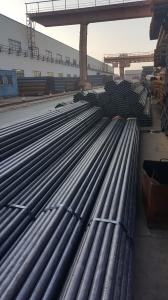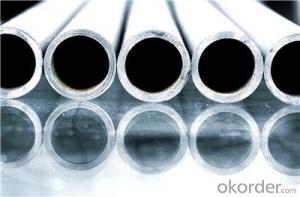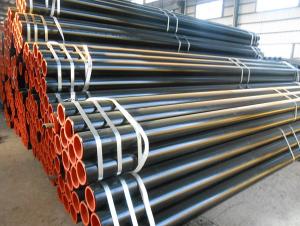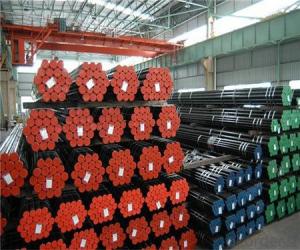Seamless steel tube API 5L of high quality and inexpensive
- Loading Port:
- Tianjin
- Payment Terms:
- TT or LC
- Min Order Qty:
- 25 m.t.
- Supply Capability:
- 10000 m.t./month
OKorder Service Pledge
OKorder Financial Service
You Might Also Like
1、Structure of Seamless steel tube API 5L:
Seamless pipe is formed by drawing a solid billet over a piercing rod to create the hollow shell. As the manufacturing process does not include any welding, seamless pipes are perceived to be stronger and more reliable. Historically seamless pipe was regarded as withstanding pressure better than other types, and was often more easily available than welded pipe.
2、Main Features of Seamless steel tube API 5L:
• High manufacturing accuracy
• High strength
• Good visual effect
• Reasonable price
• Small inertia resistance
• Strong heat dissipation ability
3、Seamless steel tube API 5L Specification:
Standard | GB, DIN, ASTM ASTM A106-2006, ASTM A53-2007 |
Grade | 10#-45#, 16Mn 10#, 20#, 45#, 16Mn |
Thickness | 8 - 33 mm |
Section Shape | Round |
Outer Diameter | 133 - 219 mm |
Place of Origin | Shandong, China (Mainland) |
Secondary Or Not | Non-secondary |
Application | Hydraulic Pipe |
Technique | Cold Drawn |
Certification | API |
Surface Treatment | factory state or painted black |
Special Pipe | API Pipe |
Alloy Or Not | Non-alloy |
Length | 5-12M |
Outer Diameter | 21.3-610mm |
Grade | 20#, 45#, Q345, API J55, API K55, API L80, API N80, API P110, A53B |
Standard | ASME, ASTM |
1) Material:20#(ASTM A 106/A53 GRB.API5LGRB,GB),45#,16Mn,10#.
2) Specification range:OD:21.3-610mm,WT:6-70mm,length:6-12m or according to the requirement of clients.
3) Excutive standards:GB,ASME API5L.ASTM A 106/A53,Despite of the above standards,we can also supply seamless steel pipe with standard of DIN,JIS,and so on,and also develop new products according to the requirements of our clients!
4) Ends:Beveled or square cut,plastic capped,painted.
5) Packing:bundles wrapped with strong steel strip,seaworthy packing.
6) Surface:black lacquered,varnish coating or galvanized.
4、Packaging & Delivery
Packaging Details: | seaworthy package,bundles wrapped with strong steel strip |
Delivery Detail: | 15-30days after received 30%TT |
5、FAQ of Seamless steel tubeAPI 5L:
①How is the quality of your products?
Our products are manufactured strictly according to national and internaional standard, and we take a test
on every pipe before delivered out. If you want see our quality certifications and all kinds of testing report, please just ask us for it.
Guaranteed: If products’ quality don’t accord to discription as we give or the promise before you place order, we promise 100% refund.
②How about price?
Yes, we are factory and be able to give you lowest price below market one, and we have a policy that “ for saving time and absolutely honest business attitude, we quote as lowest as possible for any customer, and discount can be given according to quantity”,if you like bargain and factory price is not low enough as you think, just don’t waste your time.Please trust the quotation we would give you, it is professional one.
③Why should you chose us?
Chose happens because of quality, then price, We can give you both.Additionally, we can also offer professional products inquiry, products knowledge train(for agents), smooth goods delivery, exellent customer solution proposals.Our service formula: good quality+good price+good service=customer’s trust
SGS test is available, customer inspection before shipping is welcome, third party inspection is no problem.
6、Seamless steel tube API 5L Images:
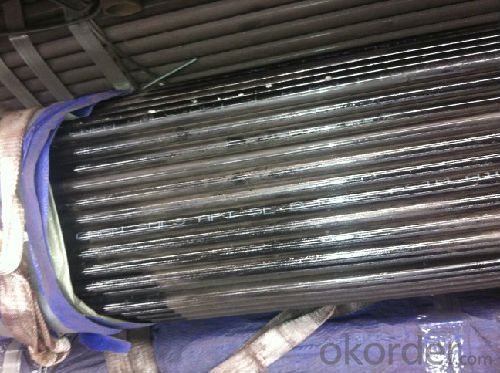
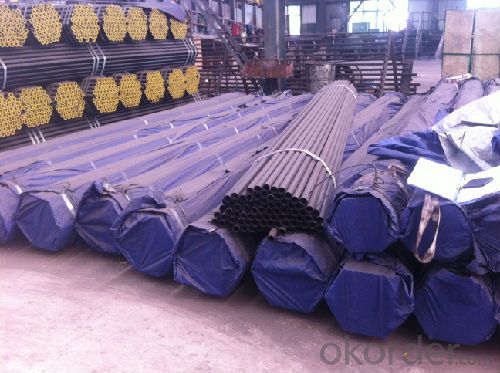
- Q: How are steel pipes used in the telecommunications network infrastructure?
- Steel pipes are commonly used in the telecommunications network infrastructure as a means of protecting and housing underground cables. These pipes provide a durable and secure pathway for the cables, safeguarding them from environmental factors such as moisture, extreme temperatures, and physical damage. Additionally, steel pipes offer excellent strength and rigidity, allowing for the installation of multiple cables within a single pipe, thereby reducing costs and simplifying maintenance.
- Q: How are steel pipes protected against soil movement?
- Steel pipes are protected against soil movement through various methods such as using casing pipes, employing anchor systems, implementing protective coatings, and utilizing concrete thrust blocks. These measures ensure that the steel pipes remain stable and secure in the event of soil movement.
- Q: How are steel pipes installed underground?
- Steel pipes are installed underground through a process called trenching, where a trench is dug to the desired depth and length. The steel pipes are then placed in the trench and secured using various techniques such as welding or threading. The trench is then backfilled, ensuring proper compaction around the pipes to provide stability and prevent movement.
- Q: What are the industries that commonly use steel pipes?
- Some of the industries that commonly use steel pipes include construction, oil and gas, manufacturing, transportation, and infrastructure.
- Q: What is the role of steel pipes in the transportation of liquefied natural gas (LNG)?
- Steel pipes play a crucial role in the transportation of liquefied natural gas (LNG) as they are used to create the necessary infrastructure for the safe and efficient transfer of LNG. These pipes are designed to withstand the extreme cold temperatures and high pressures associated with LNG, ensuring the integrity and reliability of the transportation system. They are used to construct LNG terminals, storage tanks, and pipelines, providing a secure conduit for the LNG to be transported from production sites to distribution centers or export facilities. Steel pipes are preferred due to their strength, durability, and ability to resist corrosion, making them essential for the smooth and reliable transport of LNG across long distances.
- Q: How are steel pipes used in fire protection systems?
- Steel pipes are commonly used in fire protection systems because of their durability and resistance to high temperatures. They are used to transport water or other fire suppressants to sprinkler heads or fire hydrants, ensuring quick and efficient extinguishing of fires. The strength of steel pipes also allows them to withstand the pressure and force of water flow, making them a reliable choice for fire protection systems.
- Q: What are the specifications for steel pipes used in high-pressure applications?
- The specifications for steel pipes used in high-pressure applications typically include factors such as high tensile strength, corrosion resistance, and the ability to withstand extreme temperatures and pressures. These pipes are usually made from alloy or carbon steel with specific dimensional requirements, such as minimum wall thickness and diameter, to ensure their durability and safety under high-pressure conditions. Additionally, they may need to comply with industry standards and regulations, such as ASTM or ASME specifications, to ensure their quality and suitability for high-pressure applications.
- Q: Can steel pipes be used for conveying gases?
- Indeed, gases can be conveyed using steel pipes. In different industries, such as oil and gas, petrochemical, and construction, steel pipes are commonly employed to transport a wide range of gases, including natural gas, air, and hydrogen. The use of steel pipes for gas transportation offers numerous benefits. They possess exceptional strength and durability, enabling them to withstand rigorous pressure and temperature conditions. Moreover, steel pipes exhibit remarkable resistance to corrosion, effectively preventing gas leakage and ensuring the safety and dependability of the gas transportation system. Furthermore, their smooth internal surface minimizes frictional resistance, facilitating efficient gas flow. As a result, steel pipes are a reliable and extensively-utilized choice for conveying gases across diverse applications.
- Q: What's the difference between the fastener type steel pipe scaffold, the floor type steel pipe scaffold and the overhanging type steel pipe scaffold?
- Classification is not the only way, fastener type steel pipe scaffolding is divided by force, and the latter 2 are classified according to the structure.
- Q: How are steel pipes used in the construction of sewer systems?
- Steel pipes are commonly used in the construction of sewer systems due to their durability and strength. These pipes are used to transport sewage and wastewater from households and businesses to treatment plants or disposal sites. They are resistant to corrosion and can withstand high pressure, making them ideal for underground installations. Additionally, steel pipes can be manufactured in various sizes and lengths, allowing for efficient and cost-effective installation in sewer infrastructure.
Send your message to us
Seamless steel tube API 5L of high quality and inexpensive
- Loading Port:
- Tianjin
- Payment Terms:
- TT or LC
- Min Order Qty:
- 25 m.t.
- Supply Capability:
- 10000 m.t./month
OKorder Service Pledge
OKorder Financial Service
Similar products
Hot products
Hot Searches
Related keywords
